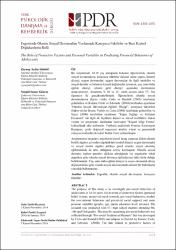Ergenlerde olumlu sosyal davranışları yordamada koruyucu faktörler ve bazı kişisel değişkenlerin rolü
Künye
Sünbül Aydın, Z. ve Sonay Güçray, S. (2016). Ergenlerde olumlu sosyal davranışları yordamada koruyucu faktörler ve bazı kişisel değişkenlerin rolü. Türk Psikolojik Danışma ve Rehberlik Dergisi, 6(45), 101-114.Özet
Bu araştırmada 14-18 yaş aralığında bulunan öğrencilerde olumlu sosyal davranışların, koruyucu faktörler (kişisel inanç yapısı, kontrol düzeyi, uygun davranışlar, uygun davranışlar ile ilgili modeller ve sosyal destek) ve birtakım kişisel değişkenler (cinsiyet, yaş, anne baba eğitim düzeyi, ailenin gelir düzeyi) açısından incelenmesi amaçlanmıştır. Araştırma 9, 10 ve 11. sınıfa devam eden 571 lise öğrencisi ile gerçekleştirilmiştir. Öğrencilerin olumlu sosyal davranışlarına ilişkin veriler Carlo ve Randall (2002) tarafından geliştirilen ve Kumru, Carlo ve Edwards (2004) tarafından uyarlanan "Olumlu Sosyal Davranışlar Eğilimi Ölçeği", koruyucu faktörlere ilişkin veriler Jessor, Turbin ve Costa (2004) tarafından geliştirilen ve Siyez (2006) tarafından uyarlanan "Ergen Sağlığı ve Gelişimi Envanteri" nin ilgili alt ölçekleri, kişisel ve ailesel özelliklere ilişkin veriler ise araştırmacı tarafından hazırlanan "Kişisel Bilgi Formu" kullanılarak elde edilmiştir. Verilerin analizinde Pearson Korelasyon Katsayısı, çoklu doğrusal regresyon analizi, t-testi ve parametrik olmayan testlerden Kruskal Wallis Testi kullanılmıştır. Araştırmanın bulguları; ergenlerin kişisel inanç yapısına ilişkin olumlu benlik algıları, çevreden algıladıkları kontrol düzeyi, uygun davranışlar ve sosyal destek algıları arttıkça genel olumlu sosyal davranış eğilimlerinde de artış olduğunu ortaya koymuştur. Olumlu sosyal davranış toplam puanları dikkate alındığında kız ergenlerin erkek ergenlere göre olumlu sosyal davranış eğilimlerinin daha fazla olduğu belirlenmiştir. Yaş, anne-baba eğitim düzeyi ve sosyo-ekonomik düzey değişkenlerine göre olumlu sosyal davranışlarda anlamlı bir farklılaşma olmadığı bulunmuştur. The purpose of this study is to investigate pro-social behaviors of adolescents at 14-18 years old in terms of protective factors (personal belief system, perceived social controls, pro-social behaviors, models for conventional behaviors and perceived social support) and some personal variables (gender, age, parent education level, income). The research was conducted with 571 high school students attending 9th, 10th and 11th grades. The data for examining pro-social behaviors was collected through "Pro-social Tendencies Measure" that was developed by Carlo and Randall (2002) and adapted to Turkish by Kumru, Carlo, and Edwards (2004). The data related to protective factors of adolescents was collected via the related subscales of "Adolescent Health and Development Questionnaire" that was originally developed by Jessor, Turbin, and Costa (2004) and adapted to Turkish by Siyez (2006). Pearson Correlation Coefficient, multiple linear regression, ttest and non-parametric technique of Kruskall Wallis Test were used in analyzing the data. According to the results of the research; positive self-perception related to personal belief system, social controls, pro-social behaviors and perceived social support are positively related to pro-social behavior tendencies of adolescents. Moreover, girls were found to have higher scores than boys in the total scores of pro-social behavior tendencies. Age, socio-economic status and parental education level were found insignificant variables in predicting prosocial behaviors.


















